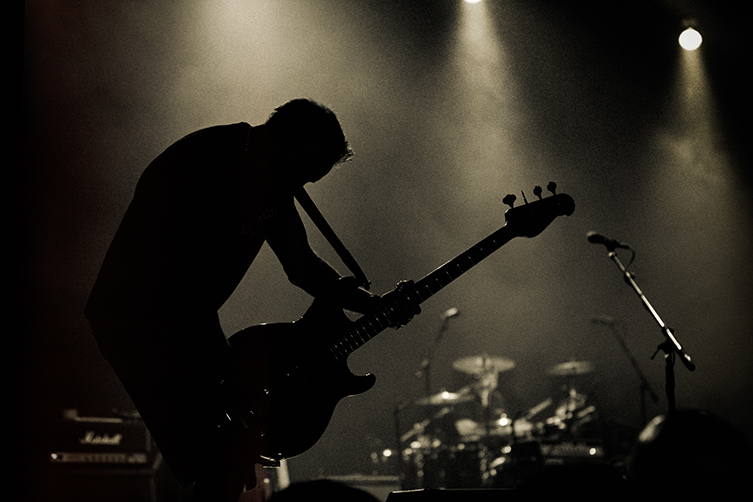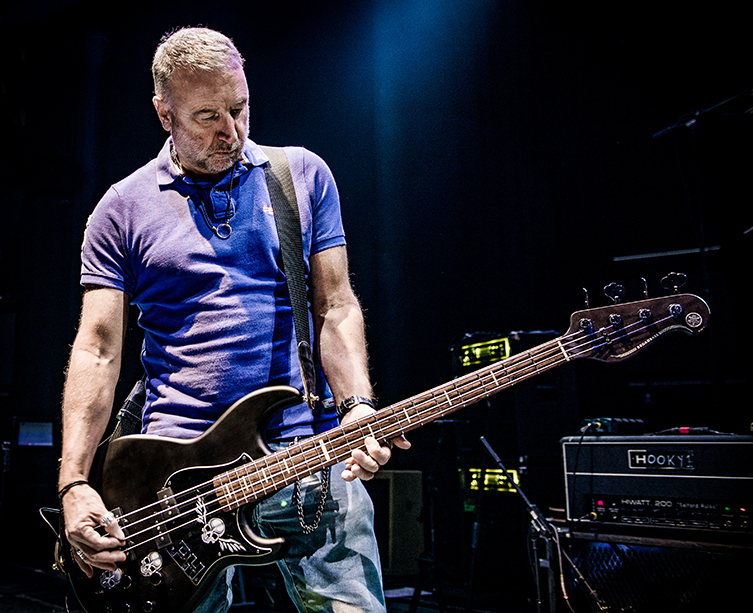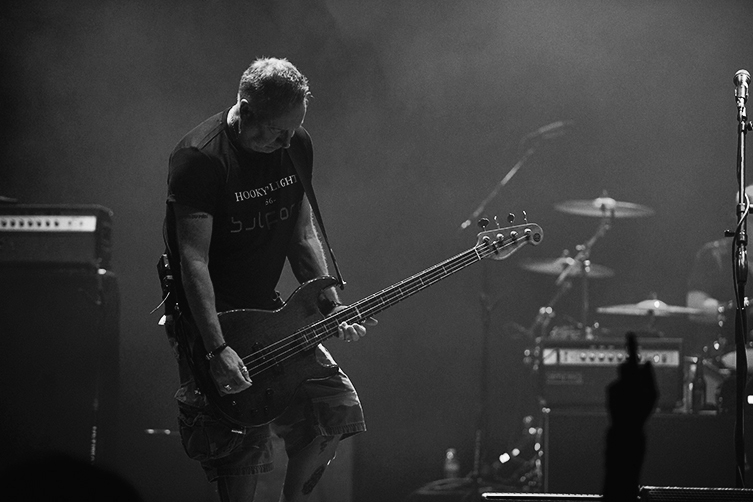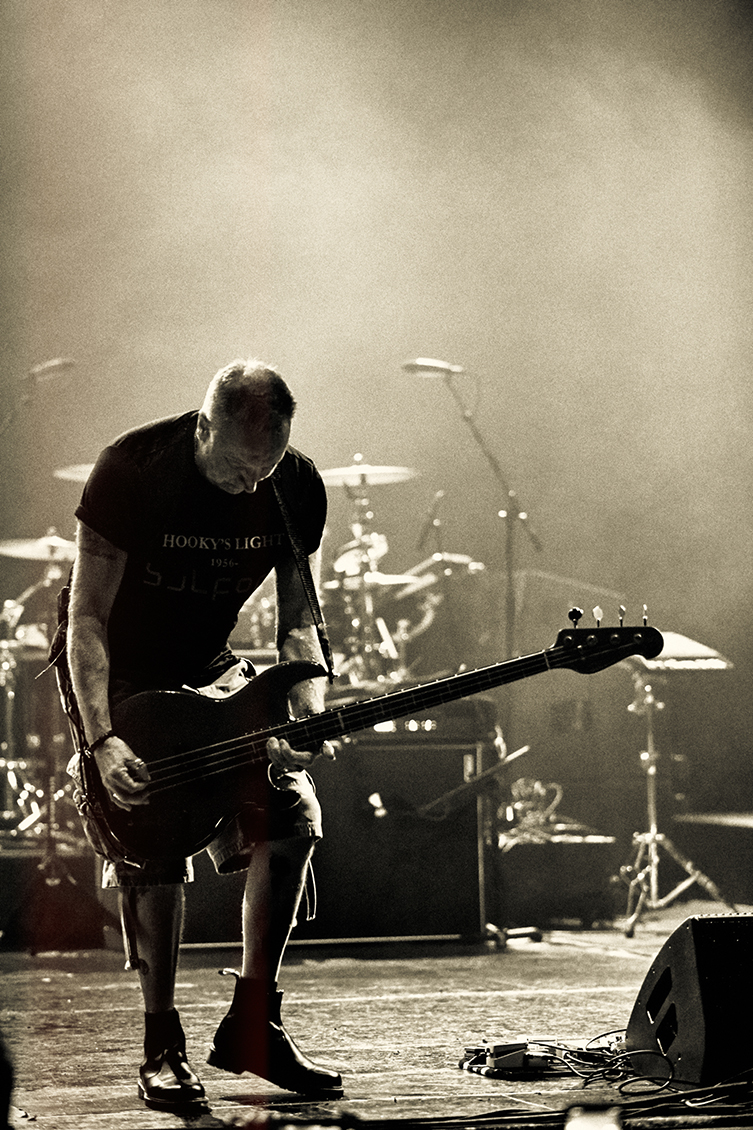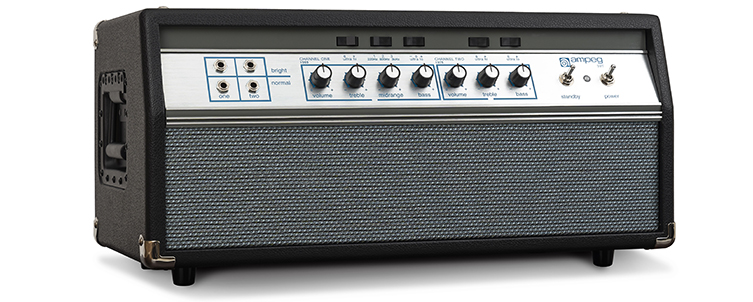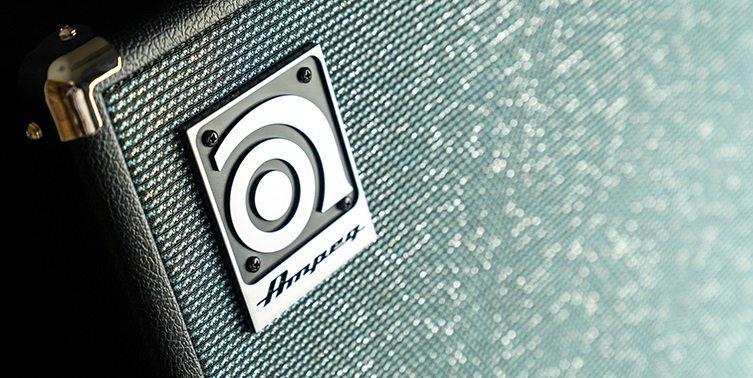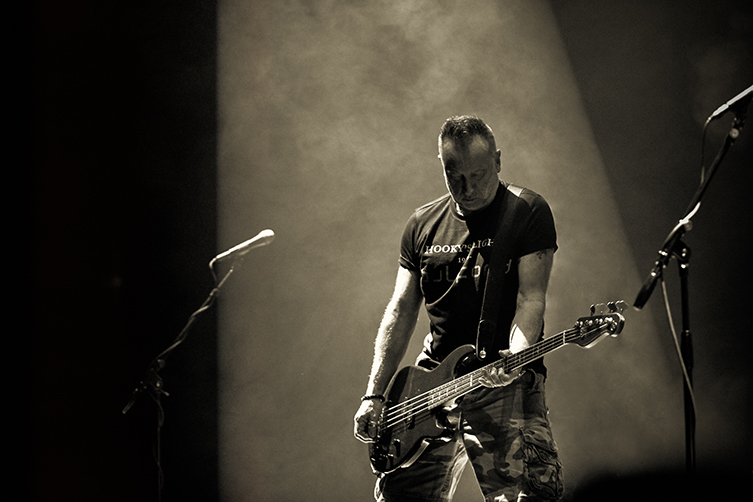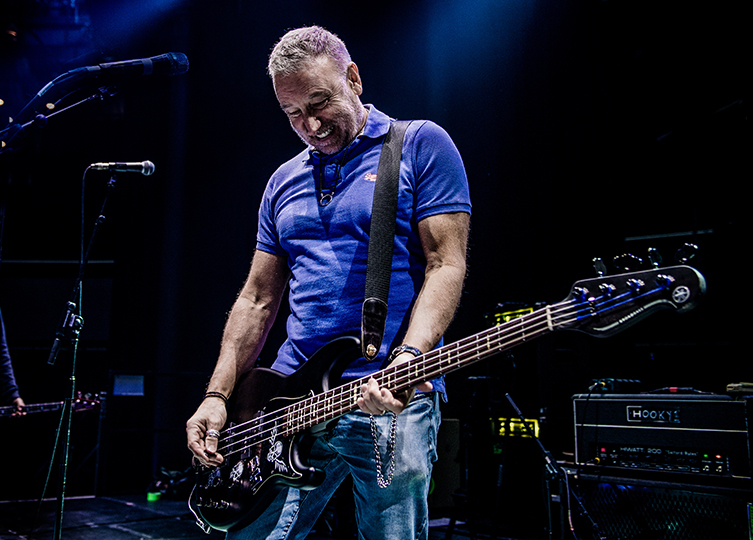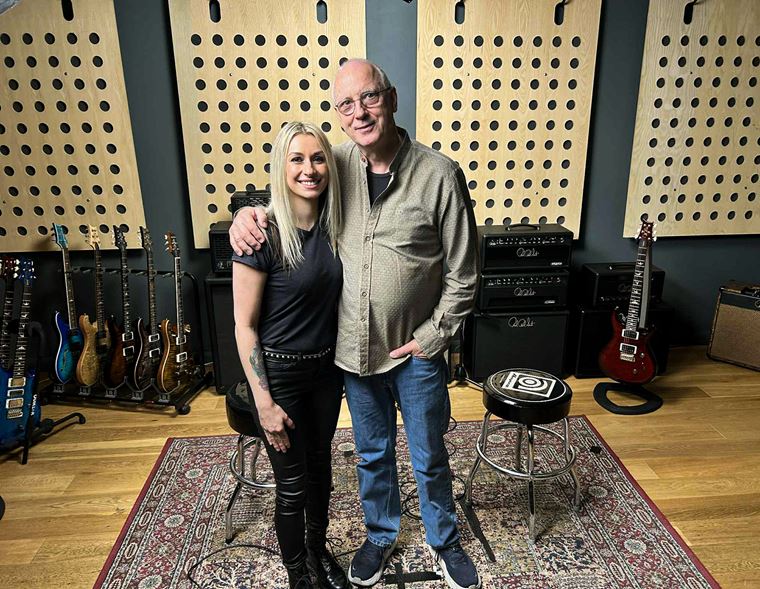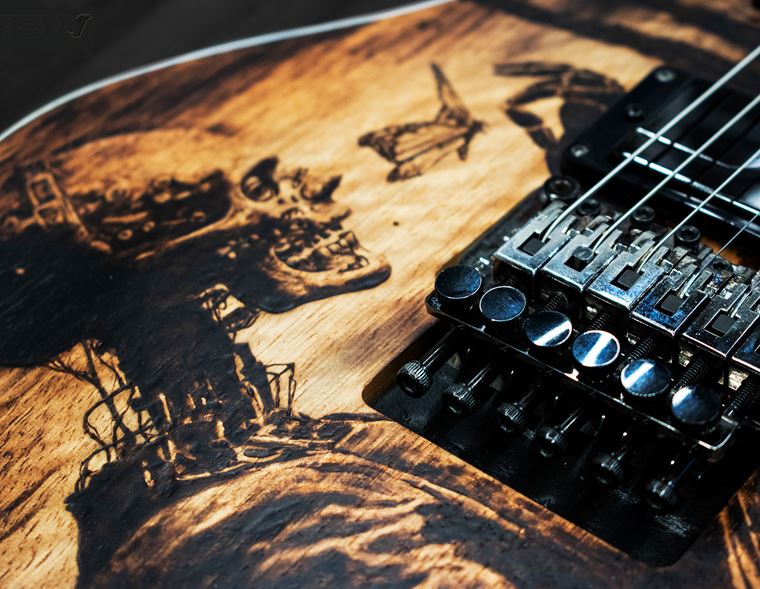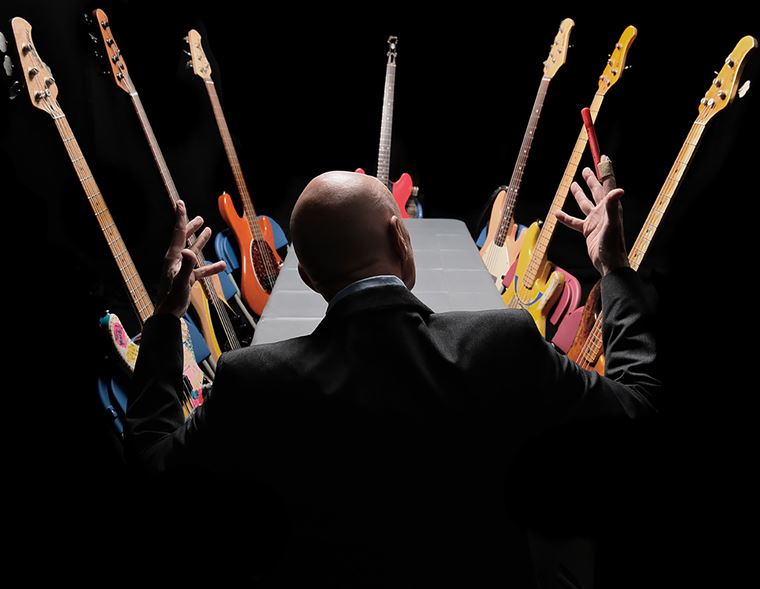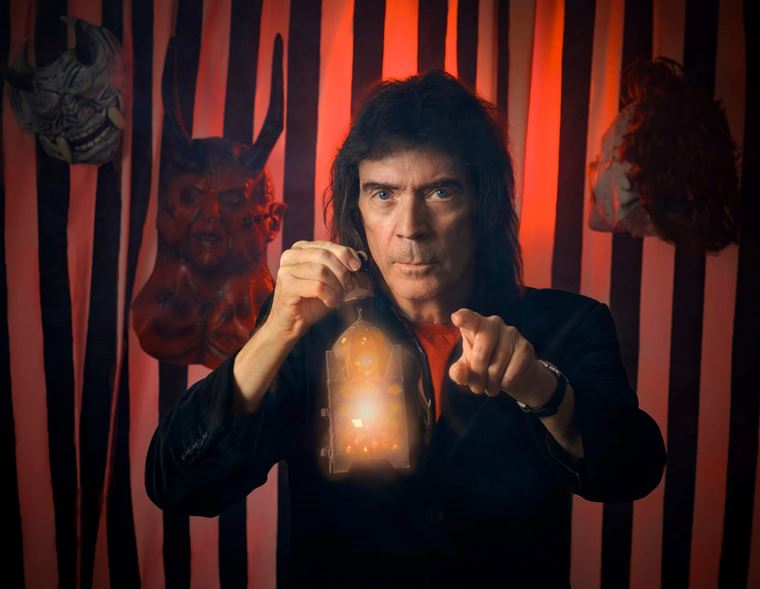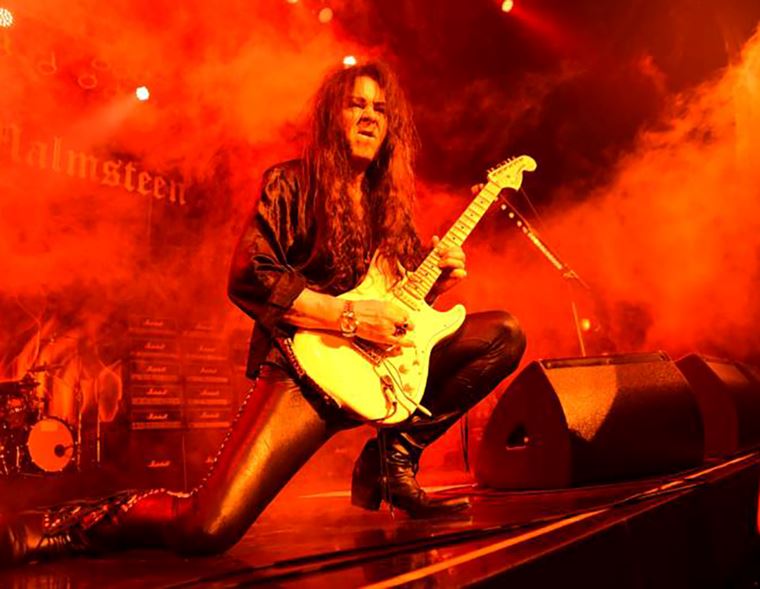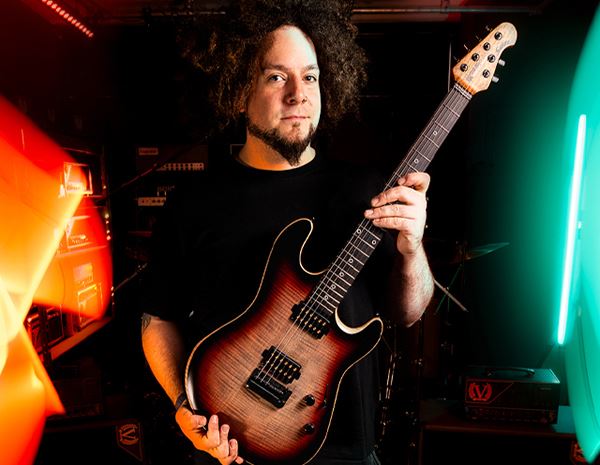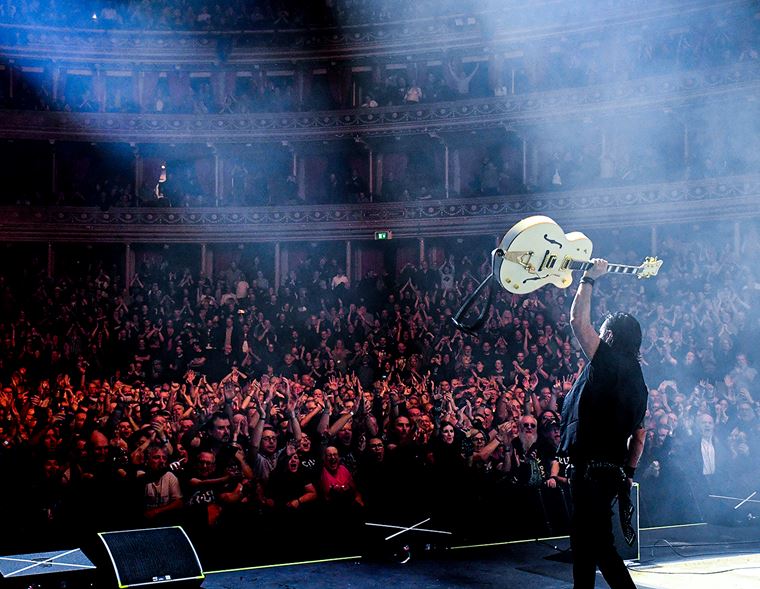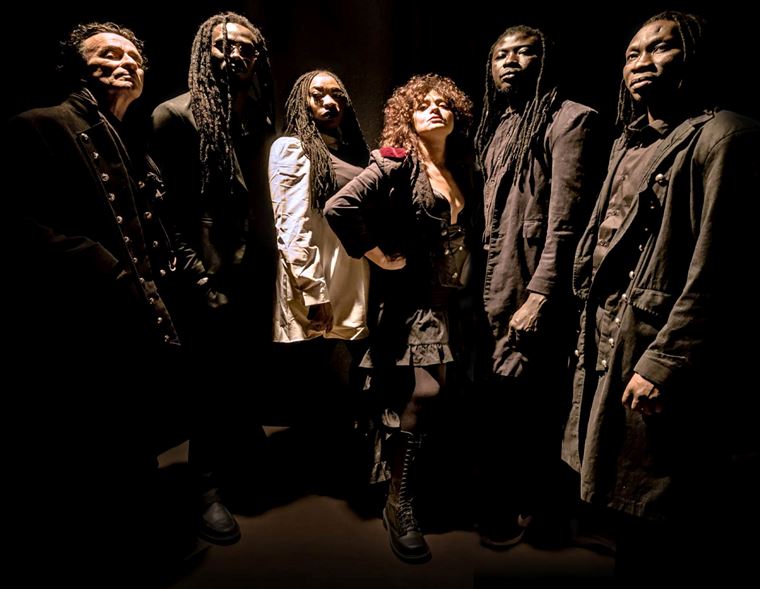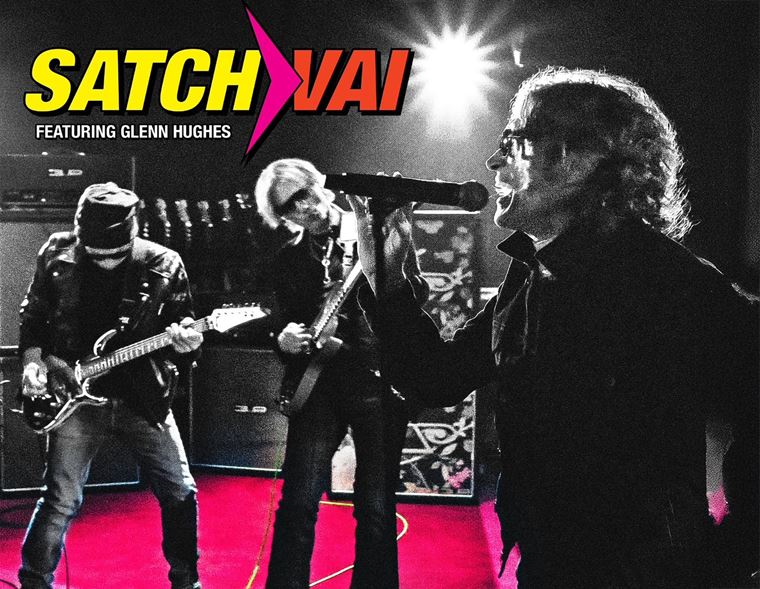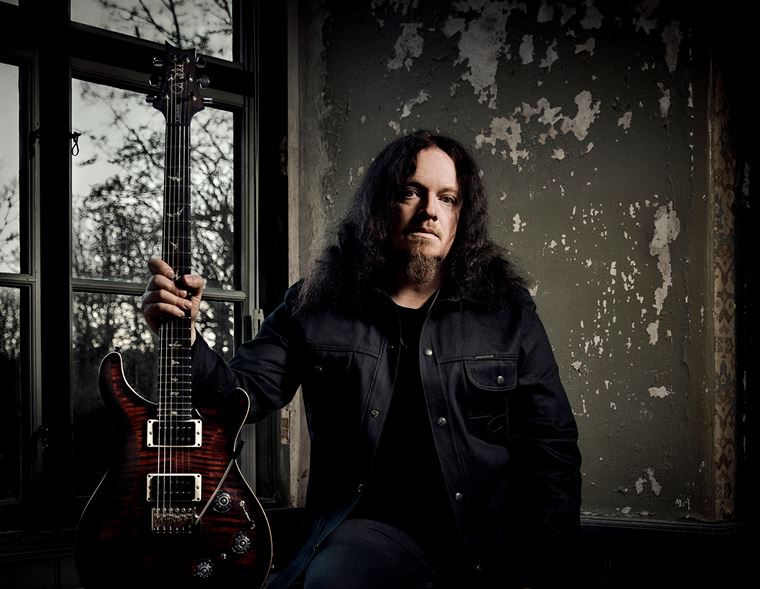Peter Hook: Ian Curtis, New Order and New Basses!
It’s hard to believe, but it’s almost exactly 40 years since Joy Division played their last ever gig.
It’s common, these days, for fans of a particular band to say that they ‘changed musical history’ or some other such hyperbolic statement. It’s natural, when people talk about things they love, to kind of overstate things. Passion tends to do that, and it’s part of being a music fan.
But Joy Division did change music. There was a distinct ‘before’ and ‘after’ in terms of the musical landscape that surrounded this group from Salford. You can pick out any element of their sound, from Stephen Morris’s militant drum rhythms to Bernard Sumner’s icy guitars, from Peter Hook’s iconic, melodic basslines to Ian Curtis’s deep baritone vocal, and see a long trail of influence that continues up until today. Their bleak, futuristic sound still feels like it’s lying somewhere ahead of us. There’s always the feeling that we’re all a distance behind, catching up and taking lessons as we go.
Joy Divison were onto something powerful and original, and though it wasn’t to last long in terms of their time together as a band, it has become eternal in its own way. The mark they made was just too significant, and the sound they created with producer Martin Hannett still informs the imaginations and interior worlds of a huge number of fellow musicians across the globe.
Joy Division vocalist Ian Curtis died 40 years ago also, less than three weeks after what became their last gig. Out of this tragedy, the remaining members eventually carried on, becoming New Order and creating a sound almost as influential as Joy Division’s.
Indeed, New Order’s pioneering amalgamation of indie rock and electronic dance music was something that had not been done in such a clear and determined way before. Blending their atmospheric rock to cutting-edge synth textures and drum machine rhythms, New Order’s work in the 1980s paved the way for a great many diverging musical styles in the 90s and beyond.
It’s rare for a band to make such an impact once, but these musicians did it twice!
Bassist Peter Hook has an immediately recognisable sound. Melodic, high-pitched and bathed in his signature Chorus effect, his bass is as much a lead instrument as it is a harmonic and rhythmic base for the songs. His sound is justifiably one of the most famous and recognisable in modern music, influencing everyone from Nine Inch Nails to Interpol.
We were recently given the rare privilege of talking with Peter on the phone, whilst under Covid-19 lockdown like the rest of us. We wanted to discuss bass playing, significant anniversaries and his love of Ampeg bass amps, amongst many other things. We’d tried unsuccessfully in the past to gain an audience with him, so this was a special triumph indeed! We had lots to ask this legendary musician, and we found him on fine, friendly fettle. Charming, quick to laugh and always ready with a suitable anecdote, Peter’s an old hand at these things, which made our conversation a pleasure.
Almost as legendary as the music itself is the acrimony within the New Order camp. Since 2007, when Hook quit the band, the always fractious inter-band dealings broke down into a bitter, drawn-out court case. This indeed forms part of our conversation, following enquiries from us regarding Hook’s successful run as a non-fiction author of his own musical history.
So, here is our exclusive interview with one of the main driving forces behind Joy Division, New Order, and a whole concept and aesthetic of rock music. We cover lots of ground: some of it you’re sure to know since it has passed into rock history, and some of it will hopefully be new to you!
Peter Hook Interview
Guitarguitar: Peter, thank you so much for talking to me!
PH: That’s not a problem!
GG: Cheers! So, we have Ampeg to discuss today but I’d also love to talk about Joy Division, New Order and just bass playing if that’s cool?
PH: Yeah, that’s absolutely fine!
GG: Cool, nice one. So, first of all, how are handling this lockdown?
PH: (laughs) I’m okay actually! The interesting thing is the relationship aspect, isn’t it?
GG: Yeah, totally.
PH: Yeah, of you and your Missus. I’ve actually really enjoyed it, because I’ve been getting loads of shit done that I’ve been putting off for probably ten years! So that part of it’s good. But, yeah, spending 24 hours a day with each other’s a test, isn’t it?
GG: Yeah, definitely!
PH: But we’re doing well, yeah. How about you?
GG: Well, it’s a funny one because I’m sitting here at my kitchen table with my work computer, working from home, and the sun’s shining which is weird enough for Glasgow but you know what, there’s a guitar there, plenty of books...I’m not missing people too much.
PH: Good.
GG: Just freedom!
PH: Yeah, well I guess you do have to thank heavens for small mercies!
GG: Exactly! But that means that touring is off for most bands. I see you have dates up for next January?
PH: Yeah, I mean, it’s quite a weird situation that you’re in, really. You can’t cancel them. They venue has to cancel them, you see. And the venues are taking advice off the government, so you’re in quite a weird position, you know, from a financial point of view. So really, you’re depending on what the government directive is. You’re getting a weird hierarchy: I didn’t pick January; it was dictated to me. Obviously, I wanted it to be May 18th, which would have made it such a fantastic day. (May 18th 2020 will be the 40th Anniversary of Ian Curtis’ death – Ray)
GG: Of course, yeah.
PH: The thing we’re celebrating, I think, is the way his life went on. Now in normal terms, you know, when someone takes their own life, their life ends that day. But in a strange way, Ian Curtis’ and Joy Division’s almost, in a weird way, began that day. So, what I’m celebrating is his life, not his death.
GG: Certainly.
PH: It would’ve been so wonderful to do it on the same day, but so be it: it’s moved to January. Cos we’re celebrating the 40 years, you see. But I think everybody is going to be quite forgiving: I think if we all get through this (coronavirus lockdown), I don’t think anybody’ll give a fuck! (laughs) It’s just the fact that we got through it. So yeah, the venues have moved us back to January. From what I can judge...judging by the cancellations I look at more or less every day, it looks like most gigging is gonna have a year off.
GG: Yeah, it seems that way. So, in that interim - I mean, I was gonna ask you later on - but I’ve read your three books and immensely enjoyed them...
PH: Oh, wow!
GG: Yeah. So, I was thinking, now that you’ve got all this time, you could be getting on with another book, but you are kind of almost up to date with your story, apart from The Light, aren’t you?
PH: Yeah, I mean, the interesting thing is that all of my books have had an unhappy ending.
GG: Hahaha! True!
PH: Right? I’m sort of desperate to write one with a happy ending. Now, I suppose in a funny way, the happy ending is, y’know: you’re still here, still doing what you love, you’re getting paid for it, and you’re successful doing what you love. So, I suppose it’s a happy ending! But, you know, we’re human beings! It’s quite an odd one. Everybody keeps saying ‘oh, you gonna do another book’, you know? But...yeah...the three stories – the Hacienda, Joy Division and New Order – were such fantastic stories, it was a gift.
GG: Oh, yeah.
PH: Once you learn how to write, it was a gift, an absolute gift to tell those stories. I mean, the only thing that fuck those stories up, really, was the legal aspect! (laughs) Yeah, the lawyers were cutting them to shreds at the end! If the real books were to come out, oh my god, they’d have been insanely popular! So yeah, I do sit there thinking...it depends, really, I mean, to be honest with you, I was asked to do a forward for a music law book.
GG: Wow!
PH: Because, obviously, I’ve been through an 8-year legal fight!
GG: That’s like getting a degree, isn’t it? Haha!
PH: Yeah! I could definitely have a new career as a solicitor, if not a bloody barrister! I’ve certainly paid for it, put it that way! So, the thing is, I was thinking, you know what? How many groups have fought legally? Literally as many groups as there are! I was reading Debbie Harry’s book today, and Debbie Harry had a big legal fight with her band.
GG: Oh yeah?
PH: Yeah, yeah! Because she carried on using the name ‘Blondie’, for a start. The original members of the band sued them because they weren’t involved, so they put in those years but weren’t getting any credit or money from it. And I was thinking, oh my god, every bloody band’s done this! But she never elaborated.
GG: Oh, I see.
PH: I was thinking maybe it’d be time, because what I found in my legal battle was that the law was certainly not there to help me. I felt very much the victim of what they perpetrated.
GG: Okay.
PH: How they did it. And yeah, you’re thinking ‘oh wow’! It’s like if you lugged it on the street, and you are getting involved, you think ‘Ah, great! I’m the victim, I’m gonna get looked after here’. But what happens with English law is that really, it’s so complicated and almost built to make the victim more victimised, in a way. So, I was thinking that I may write a book about the legal battle. I mean, it’d be quite technical, funnily enough. So, people who are interested in music, and interested in that side of things, can actually have it in full.
GG: That’s an amazing idea.
PH: Well, it’s just something that...most people, as soon as it is mentioned, glaze over, yeah?
GG: Mm, yeah.
GG: Cos they’re like ‘Oh god...’, it’s like hearing about someone’s divorce. After you’ve heard about it in the pub about 15 times, they’re like, ‘Oh, Jesus, give over’. But no one’s ever told the story of what’s physically and mentally done: how physically draining and how mentally draining it is. And how difficult, in my part, I’ve found the English legal system. So that was crossing my mind. I keep thinking about it, because, to be honest with you, even though the court cases were settled, our relationship was been as bad as ever. We have to communicate through solicitors, so it’s really very much an ongoing situation.
GG: Wow.
PH: Exactly. This has been going on now for 13 years.
GG: It’s mental, isn’t it?
PH: Yeah, and it is such a waste of time. So yeah, I think that is gonna be my next book. It might not be a book in length, but I do think I am gonna write it because I need to get it off my chest and out of my head.
GG: Yeah, it’s proper closure as well, isn’t it?
PH: Yeah! And also, it lets people know exactly what happened, because most people – fans, journalists, whatever – they get an idea: ‘oh yeah, it was silly when someone...’, you know, they get an idea but they don’t actually know exactly what it was and how exactly it turned out, you know? So, I am thinking of doing that. It’s still very apparent in my life, shall we say.
GG: It’s a story that’s worth telling, as you’ve said, but not only that: with the 40th anniversary and celebration of Ian, that could provide the triumphant end you’re looking for?
PH: Well, it certainly wasn’t triumphant, I have to say.
GG: Not that part, but the getting through it part. Playing the songs...
PH: Yeah, getting through it was a bloody triumph and I tell you what, it made me look at things in a completely different way. Still, that’s what I’m considering as my next book, because I think I need it for my mental health (laughs)!
GG: Haha! Nice one. Ok, so can we talk about your bass playing for a wee bit?
PH: Yeah!
GG: For so many of us, your high register melodic bass style is a very iconic sound. I know there must have been some sort of precedent to that, but it’s like your sound came out of nowhere: you very much invented that. What I was wondering was, previous to Joy Division, did you have any bass playing heroes or influences? Perhaps as you were learning the ropes?
PH: No, not as I was learning the ropes, no. I sort of realised after I started that I had a couple of bass playing heroes. The main one was Carol Kaye.
GG: Oh cool!
PH: Motown, because I was a huge Motown fan. Her playing was amazing, so I suppose I did have her subconsciously. When I became a punk, I sort of got the more obvious ones, maybe, in a way, consciously. One was Jean-Jacques Burnel.
GG: Aye, I was wondering about that one!
PH: Yeah, definitely. I actually took a photo of his bass setup at Bingley Hall, Stafford after I’d seen them (The Stranglers) play, and then went and got it all for myself! (laughs)
GG: Yeah, definitely!
PH: Yeah! And it worked out for me, actually! He had a Vox 2x18” cab and a Hiwatt 100w head. I remember nearly getting thrown out by the bouncers because I...actually, it wasn’t a photo, I was writing down what it was.
GG: Ah, ok.
PH: I got as near to the stage as possible so I could write it down, had to borrow a pen and piece of paper at a gig so they must’ve thought I was fucking nuts (laughs). So I found out later that the Vox was a 2x18”, I found out what Vox’s history was, through the Beatles etc. So, I ended up with the same setup as him because I was so in awe of him. And then it was Paul Simonon. The real I liked Paul Simonon, it wasn’t...he was a very competent bass player of course but his style was very much like on the guitar, backing what the guitar did. So, it was a combination of those two. I loved the way Paul Simonon looked, I loved the way he moved, I loved the way Jean-Jacques Burnel sounded, so it was just all about doing my own way of interpreting that. The interesting thing with Joy Division is that Barney’s (Bernard Sumner, Joy Division guitarist - Ray) amp, which was a Vox actually, a UD30, which is insanely loud for a 30-watt, mean that I couldn’t hear myself at all.
GG: I heard this! And this is why you played higher up!
PH: Yeah, and this is absolutely true. I played higher up because it cut through. So it was one of those weird things, and whenever I played high, I was always encouraged, very, very much, by Ian Curtis, to carry on playing high. So, what happened then was, there was a rash, shall we say, of songs played in the high register! She’s Lost Control and so on, and it was through Ian going ‘Play high, Hooky! Play high! It sounds great when you play high!’ So yeah, it was wonderful to have a champion.
GG: Wow, so he recognised that in your playing first?
PH: Yeah, yeah yeah! It’s funny, I mean, we could’ve gone the other way, because I do remember, Barney and I had been friends since we were eleven, and when we started the group when we were twenty, I remember one of the first arguments we ever had was when we were practicing and he said to me, ‘Can’t you just follow the guitar?’
GG: Hahaha!
PH: I’d have ended up like Paul Simonon, wouldn’t I? And I said no, I said, ‘You fucking follow me!’
GG: Yes! Haha!
PH: It was our first banging of heads, if you like, in the group. And then of course it just went on like that, head-butting each other like a herd of water buffalo.
GG: Yeah, totally! And so, then afterwards, you got hold of the six-string Shergold Marathon. That must’ve made it easier to, um, stand on Barney’s toes, right? Taking over guitar parts!
PH: Yeah...a lot of people still listen to the six-string bass guitar and think that it’s a guitar. So, it’s odd, but maybe sometimes people don’t care what you play as long as you play it with authority. But I mean, it was Barney, funnily enough, who suggested I try a six-string bass. Very magnanimous of him, because he said, ‘It would suit your style’!
GG: He was right enough!
PH: This was after he’d tried to get me to follow the guitar! And he was absolutely right! The six-string bass actually, for me, worked really well. And I must admit, I’ve never heard...I mean, I’ve heard plenty of bass players play like me on a four-string bass, but I’ve not heard any, that I can recollect, that’ve played like me on the 6-string.
GG: How is the Shergold tuned?
PH: It’s exactly the same as a guitar.
GG: Right, okay. I’ve listened to a ton load of Joy Division and New Order, and I’m not massively sure which songs use the Shergold?
PH: Well, I’d have to look down the list and tell yah, but it’s Joy Division I play more often, so I’m more au fait with those parts, so Passover, because it’s the rhythm on Passover (hums the chordal riff) you know, and then going low, it’s on the low strings. So, yeah, I mean I was very lucky actually, with six-string bass because Martin Hannett (visionary Joy Division producer - Ray), in his infinite wisdom when he tried to design my bass rig - which was quite weird, actually, because on the Joy Division recordings, he really had the bass down and had it quite ethereal sounding and quite whooshy. It was a bit of a contradiction, really, for him to design this as he did, which was a massive set up. It was an Alembic Stereo 5 preamp going into an Amcron DC300A, which was a thousand watts a channel solid state amplifier.
GG: Holy shit.
PH: So the thing is, I was able to balance the sound of the six-string bass, which was a normal, passive circuit, against the four string bass, which was active.
GG: Oh, I see!
PH: And the Alembic allowed me to do that, because it had twin inputs. It was a two-channel bass amp. So I was lucky, early on, because I was able to get round a problem, which was balancing the six-string against the four-string. So, Martin Hannett really did me a favour! Unfortunately, again, it ignited another massive problem, in that the sound man was always trying to get me to turn down! (laughs) You know? It’s the age-old arguments! In every band!
GG: Nothing changes!
PH: No! So, yeah, I was lucky.
GG: See in terms of the basses that you’ve chosen, you mentioned JJ Burnel and Paul Simonon, and they were both Fender P-Bass players. I’ve noticed that, throughout your career, you’ve tended to keep away from the obvious bass models like the Fenders and gone for more esoteric sort of designs. Was that on purpose?
PH: Yeah, yeah, I hated the sound of the Fender. And also, it didn’t have enough frets for me. The Yamaha was nearly a double octave.
GG: I only just noticed that on my P-Bass as I was playing it waiting to call you! It’s got 20 frets!
PH: Haha, yeah, it was simply that. And the Fenders, they never sounded ‘bitey’ enough, they always sounded too bassy for me. And they didn’t have enough frets for me. You know, the six-string bass is wonderful because it’s a double octave. And my Hooky guitars (custom made basses) have one extra fret.
GG: Oh, cool!
PH: Yeah, because the Yamaha guitars are what I use in the studio, but live, I had a copy of a Gibson, the EB-2 and it’s a Yamaha neck straight through, with Yamaha electrics but with the Gibson body. Because of the F-holes and the sustain on the guitar, it works really well for feedback. So in my youth, when I used to use it a lot, my hero, from a guitar point of view, was Mick Ronson. I used to watch him feed back all the time and I thought, ‘I’ve got to do that!’ So, the reason I had the f-holes put in it and had it made semi-acoustic is so I could use it live and it would feed back easily.
GG: You want the feedback: most folk try to get rid of it!
PH: Yeah, cuz I used it like a guitar player, you see! It was brilliant. Trouble is, it sounds shit in the studio.
GG: Right.
PH: But, of course, I’ve got Yamahas. It’s quite funny, from a Yamaha point of view. I was telling them recently that every single track that I’ve ever recorded, up to the last one I did which was the Gorillaz about a month ago, was on a Yamaha BB1200S!
GG: Wow!
PH: So for 40 years, almost, maybe just a bit less, 37, 36 years, I’ve used the same guitar for every track.
GG: Goodness!
PH: Yeah, and I’m not too sure that there’s many a boast can be said, you know, about that!
GG: No indeed, that’s extraordinary!
PH: That started certainly with Closer, and then ended up a month ago with the Gorillaz.
GG: That’s amazing!
PG: So yeah, I keep meaning to get a discography of New Order’s, for Yamaha, and just star every track. Cos it’s the same Yamaha bass, the same one! I use my original BB1200S, I’ve got a couple of them that are the same, but I use the same one.
GG: That’s quite a tour of duty for one bass, isn’t it?
PH: Mm, definitely! Bloody hell, it must’ve done...oh my god, a hundred tracks! A hundred and twenty, maybe, maybe even more than that over the years. I must do that list for Yamaha, because on a social media thing, it would look fantastic: these are aaaaall the tracks that it has played on. You know, that only one it didn’t get on, which is quite sad actually, is Blue Monday. (laughs) That was the Shergold!
GG: Aw man! That’s weird! So, that’s an interesting point, because Blue Monday was when New Order was starting to get more overtly into sequencers and drum machines. On those records that came after that, did the fact that a synth often played the bassline free you up to play more of that signature high register style?
PH: No, I mean, the thing is, d’you remember somebody once said, ‘why did somebody invent bass sequencers?’ And it was so the lead guitarist and the singer didn’t have to talk to the bass player. (I laugh) And that was the same reason with drum machines, so they didn’t have to talk to the drummer!
So, it was interesting that you had a bassline that you could play over. Some of the early New Order tracks, there was a four-string bass playing the low bit – which wrote the low bit, actually – which transferred to the sequencer. I would play high over it. I was sort of in charge of it for a while, but then, when someone discovers they could do it without you...(laughs)...it went that way! So, in a funny way, it helped, then it hindered. Yeah, so, sometimes it was a struggle, and sometimes it wasn’t.
GG: Yeah, fair enough.
PH: But, I suppose, it’s a lot like life, isn’t it?
GG: Yeah, very much so! Um, so for all the bass fans, we all want to know about the equipment and the gear. It was original an Electro-Harmonix Clone Theory that was your Chorus sound, wasn’t it?
PH: It still is! Yeah, I’ve got 12 of the fuckers. Which is coming down as one gets pillaged for spares. I’ve got, like, 7 working and 6 in bits. It’s a bit scary actually, because the thing is, from a live point of view, you don’t notice the noise of an old analogue foot pedal. The trouble is, when you go in a studio, now, the noise noise sticks out like a sore thumb. So, from a studio point of view, you tend to use something that’s a bit more modern. But live, it’s always the Clone Theory. I mean, if you listen to the bass on Aries by the Gorillaz, that is my Electro-Harmonix. He just said, ‘Don’t worry about the noise. Fuck it’, you know? It does get on your tits, sometimes. I mean, every time you plug it in, it’s a different noise! (laughs) Sometimes it’s bearable and sometimes it’s not, but live, I can always get away with it, you see.
GG: Of course, it’s a whole different thing. One of the guys who’s a fan was asking me to ask you about your rack: do you still have a rack of effects and stuff?
PH: Well no, I mean, the only effect I use these days... I make sure I’ve got a great amp. I’d been using Hiwatts until I got the new Ampeg. These new Ampegs are great for me, so I’m absolutely in heaven now. I’ve got the Ampegs as the main line, and I’ve got the Hiwatts as the backup.
GG: Oh, cool.
PH: So, I’m sorted. Speakers, these days, I find are pretty much of a muchness. So, as long as I don’t use 10 inches...you know, no pun intended, tens make it too honky. So, if I use 15-inch speakers or 18-inch speakers... 15 are my favourites. It means I get enough bass with enough punch, without it being honky. So, I’m okay for doing that.
GG: So, Ampeg’s really working out for you, then.
PH: Yeah, my son developed that relationship with Yamaha, which has turned into a fantastic relationship. They took over Ampeg, and they sponsor us with Ampeg. And now, they’ve taken over Line 6, which I’m a great fan of anyway, so now I’m sponsored for Line 6! I’m like, ‘Fuck, life does not get much better than this!’
GG: Hahahaha!
PH: But, as God would hand it out, what happens? You can’t play! (laughs)
GG: Well, at least when you can play...
PH: Yeah, at home on your own! Haha! So, yeah, God giveth on the one hand, and taketh away with the other! It’s like, ‘Fuckin’ hell!’ So yeah it just shows you: the best laid plans of mice and men.
GG: Haha, oh, entirely! Well, you know one thing, though? If Line 6 are involved, their M series effects are pretty exceptional in terms of recreating classic pedals. Maybe they could do you a copy of your Clone Theory circuit?
PH: I’m happy to sit on that one at the moment, but I’ve got a new Helix that they just sent me.
GG: Ah!
PH: I’m really looking forward to using that. It’s all set up, ready to go, so I must do it, actually, sit down with it cos I’m really looking forward to the idea of having everything together in one thing. I must admit, what I’ve heard sounds amazing. And it’s got a noise gate and a tuner, and it’s all in one box. It’s like, Oh man, I can’t believe someone didn’t do this years ago.
GG: Especially if you’re sitting in your house, self-isolating (laughs) and you’ve got the box!
PH: Haha, perfect for the lockdown, yeah!
GG: I was going to ask about the technology side of things because that’s a big part of all of the music you’ve been a part of. I noticed there’s a futuristic sheen to a lot of it, be it Martin Hannett, and even after his days, there was always technology and a sense of ‘cutting edge’ about your music. I wondered if you had delved into the digital guitar thing yet, but obviously you have.
PH: Well yeah, it was interesting really, because once we got into new equipment, the sequencers and all that, and the synthesizers in 1980-81, it sort of led you into studio equipment. Our manager (Rob Gretton - Ray) in particular, ever though he could never find any money to pay your gas bill, he could certainly find enough money for an Emulator or the new Lexicon effects, or a Transdynamic. Anything that enhanced your sound, he was eager to pay for. If you wanted to shop at Marks and Spencer’s it was just a solid ‘fuck off’.
GG: Hahahaha!
PH: (laughs) You know, like that! Typical Svengali-manager sort of way. So, we were given the best equipment. I mean, New Order’s equipment: oh my God! We had like, at one point we had six Prophet 5’s, four Prophet sequencers, two Emulators, two Moogs - we always had a spare cos they were so unreliable - and literally, the cost of the equipment in 1981-82 must’ve been about 25, maybe 40 grand’s worth of equipment.
GG: Wow.
PH: That, now, would be like a quarter of a million.
GG: Yeah! That would buy you houses back then, wouldn’t it?
PH: Yeah. Yes! (inhales through teeth) It was quite weird: something again, that we never really noticed or wondered where the money came from! We were on 15 quid a week and we had this 40 grand’s worth of equipment just sat in the practice place. It was quite a contradiction to be honest, quite weird.
GG: Yeah, I’d say!
PH: But we threw ourselves into it with gusto, and everything we did, when you got to Temptation and Everything’s Gone Green, all those songs, we were using the best studio available. Best studio equipment available and we kept that style, shall we say, right the way through all our recordings, so they were very technically high quality. Of course, now, it’s a completely different world, because studios...a computer can do the bloody lot! You can do everything apart from give it soul.
GG: Well, that’s it. If I listen back to Everything’s Gone Green or Truth, from the Movement album, which are two favourites of mine, they still sound fresh and amazing. You can listen to some music from, say, 1995, fifteen years later on, and it sounds shit and dated. Was it partly because you had the very best gear?
PH: Well, partly yes, but it caught you at your creative best as well, so its both aspects. Even when I listen to Blue Monday now, and it’s on Britbox on the telly all the bloody time (laughs) and I’m thinking, ‘Jesus, it does sound very, very current. No one’s improved on that sound.
GG: Oh yeah, definitely not.
PH: I can’t believe how we did it! Mike Johnson was certainly the fixer. We would come up with these crazy ideas and he would make them work. We were very, very lucky to have him helping us. We met him when we did Joy Division and used him literally every recording up to Republic. And I think you can hear the change in sound. We sounded different from Republic onwards.
GG: That’s interesting.
PH: Yeah, we sounded more insidious up until Republic.
GG: Yeah, that’s definitely worth acknowledging. So, taking about Joy Division and New Order, as a player, your sets with The Light are extremely long, comprehensive affairs, aren’t they? Is it physically taxing?
PH: Yeah, I mean, well, my wife was moaning at me this morning, actually, for being insanely fit! (laughs). I got into fitness when I stopped drinking, which was nearly 16 years ago. I did 15k this morning.
GG: Oh, did you really?
PH: On me jogger, yeah. I’m a fitness nut, you know, so really, our three-hour sets leave me raring to go!
GG: Wow! And, forgive me for saying, but you’re maybe 63 years old or something? That’s incredible!
PH: 64, yeah! Hahaha!
GG: That’s immense! That’s more than I can do and I’m 38!
PH: (laughs) I suppose, in a funny way, it shows you the power of addiction, doesn’t it? I’ve crossed addictions from drugs and alcohol to bloody fitness! I suppose there’s worse things to be addicted to, isn’t there?
GG: Hell yeah! So, when you’re in the middle of one of these big long gigs, are there any particular riffs that you just can’t wait to play?
PH: Do you know what? I’m very lucky, actually. The weird thing about New Order, before we split up was it was really fucking boring (laughs). We were playing the same old songs every night. Barney would not entertain any of the old stuff, he really would not entertain any of the acoustic stuff. You can’t make someone play what they don’t want to play!
GG: No.
PH: So it was definitely boring. My reaction was, when New Order split, was to play all of these songs that had been ignored for thirty years. I was going through the albums, and the singles and B-sides, so our repertoire of playing...I mean, with New Order, we’d play for about an hour and a quarter, hour and twenty minutes if you were lucky. The Light were soon playing for two hours.
GG: Yes.
PH: It then graduated to three hours! So, it was an easy thing! The things is, we don’t go out with a support band, so I suppose that hour that a support band takes up, you know, it means that if we’re playing Joy Division, we’ll play New Order as a support and if we’re playing New Order, we’ll play Joy Division as a support. It keeps our repertoire really high. And I get to do what I enjoyed doing from the moment I became a musician, which is to play. There is no better thing than playing live to an appreciative, and on some occasions, unappreciative (laughs) audience! I’ve certainly had both throughout my career! So, it’s that funny thing: it isn’t a problem, it’s easy to do.
GG: Yeah.
PH: I must admit, I enjoy it. I mean, I was sat there with the boys and was thinking, I said, ‘Lads, how many songs can we play?’ Someone shouted them out, the ones we could actually play, and it was something like 150-odd songs.
GG: That’s huge.
PH: Yeah, I was like, ‘fucking ‘ell, that’s amazing!’ I spent a lot of my career, the peak of my youth actually, playing the same bloody songs over and over again. Bloody boring! It was a really sad little rut that New Order fell into. (I laugh) Just playing the same 17 songs over and over.
GG: Yeah, that’s death for a musician, isn’t it?
PH: Well, yeah! It was really weird! I mean, I wouldn’t have minded, but we had such fantastic songs, from Truth, Everything’s Gone Green, that wasn’t on an LP, you know? You start looking at these songs and going, ‘Oh my god! How could we ignore them!’
GG: Yeah, it’s mad. At least it’s getting sorted now! Peter, I know we need to wrap this up soon, so I just have one last question if that’s okay?
PH: Yeah, go ahead!
GG: Thanks! So, it’s a relatively cheesy question but it’s something to go out on, if you like. You are a major part of one of the most influential, and most loved, collections of music in modern history. How does that feel for you to be a part of that?
PH: (Starts laughing) Well, I can say that it has as many upsides as it has downsides. The saddest thing is, is that Joy Division is a little bit detached, but I still have problems. If the three of us were together on Joy Division, I think we would enjoy it a hundred times more. The fact that the four of us aren’t together on New Order, again, means that you’re in a constant battle with the others for, you know, just the way it’s ran. It’s a really, really sad indictment. So, I don’t get to sit here with the big grin on my face that I should have, because occasionally I get the grin and then something happens, from a business point of view, that wipes that grin off your face. It’s always the same with this game, we have the same conversations, don’t we? Most groups are like this. I mean, the thing is, I got this PRS cheque for the last quarter, and it was a lovely amount. I won’t tell you what it was, but it was a fair amount of money, it was very good. And a quarter of it, in fact more than a quarter, was Blue Monday, you know?
GG: My goodness. One song from nearly 40 years ago?
PH: Yeah, and all these years after doing it, the only person I could share it with is my wife (laughs). I can’t phone up Barney and go, ‘Fuck me man, isn’t that amazing? How wonderful is that?’ I can’t phone up Steve and I can’t phone up Gillian because of what they did to me.
GG: Such a shame.
PH: You cannot celebrate with the rest of the band. And even managers, you can’t celebrate with, because they aren’t my managers. It’s a constant battle and it’s so sad. So yeah, you get those massive grins, and then you get the little bit of sadness. But, I must admit, the grins outweigh the sadness, and I’m immensely proud of every time I hear that bloody tune start up! I’m immensely proud of it. I mean, I was watching a program, The Nest, on telly, I don’t know if you saw it? It’s set in Glasgow, actually.
GG: No, I didn’t see that.
PH: Yeah, it was really good. It was about a surrogate mother. Great series, very well written, very gritty, real cliff-hanger ending, and right at the end, it went into an acoustic version of Love Will Tear Us Apart.
GG: Oh wow!
PH: It was so perfect! You know when there’re moments when you go, ‘Oh my God, that fits!’
GG: Yeah!
PH: Fucking perfectly, at the end of this wonderful program! And the only person I had to share it with was the wife. (laughs) But I wrote that riff! I wrote that riff all those years ago, and it’s so sad that there aren’t the other band members to phone up and go, ‘Oh, did you hear that? It sounded wonderful!’ But listen: that’s life. We’re all still here, we’re still almost smiling, and life goes on, which is the thing we have to remember in these very, very difficult times.
We parted on these wise words, Peter to his busy afternoon and me to a celebratory cup of coffee in my kitchen ‘office’. Peter had generously let me overrun my allotted half hour, but I still had plenty to ask: we never even mentioned the Hacienda! So it goes.
Due to the Coronavirus, Ian Curtis’ Anniversary will, by necessity, have to occur without any live bands to play a suitably austere fanfare to his genius. Touring, as Peter said, will re-commence next year, in a world that’s hopefully safer and more understanding of the things that matter: music, friendship and joy. Peter will be out there celebrating his great friend, and we're sure it's going to be a magical, transcendant experience for everybody.
We’d like to thank Peter Hook for giving us such a warm, friendly and interesting conversation. We’d also like to thank Dave at Yamaha for putting us in touch. Keep up with Peter’s 2021 tour over at the official Peter Hook & The Light website.
Read a further extension to this interview, with Hooky talking about his new signature bass in our Peter Hook Signature Bass World Exclusive! We couldn't talk about this at the original time of publication since the bass was still top secret!
Click to see our Ampeg Amplifier range
Thanks for reading.
Until next time

